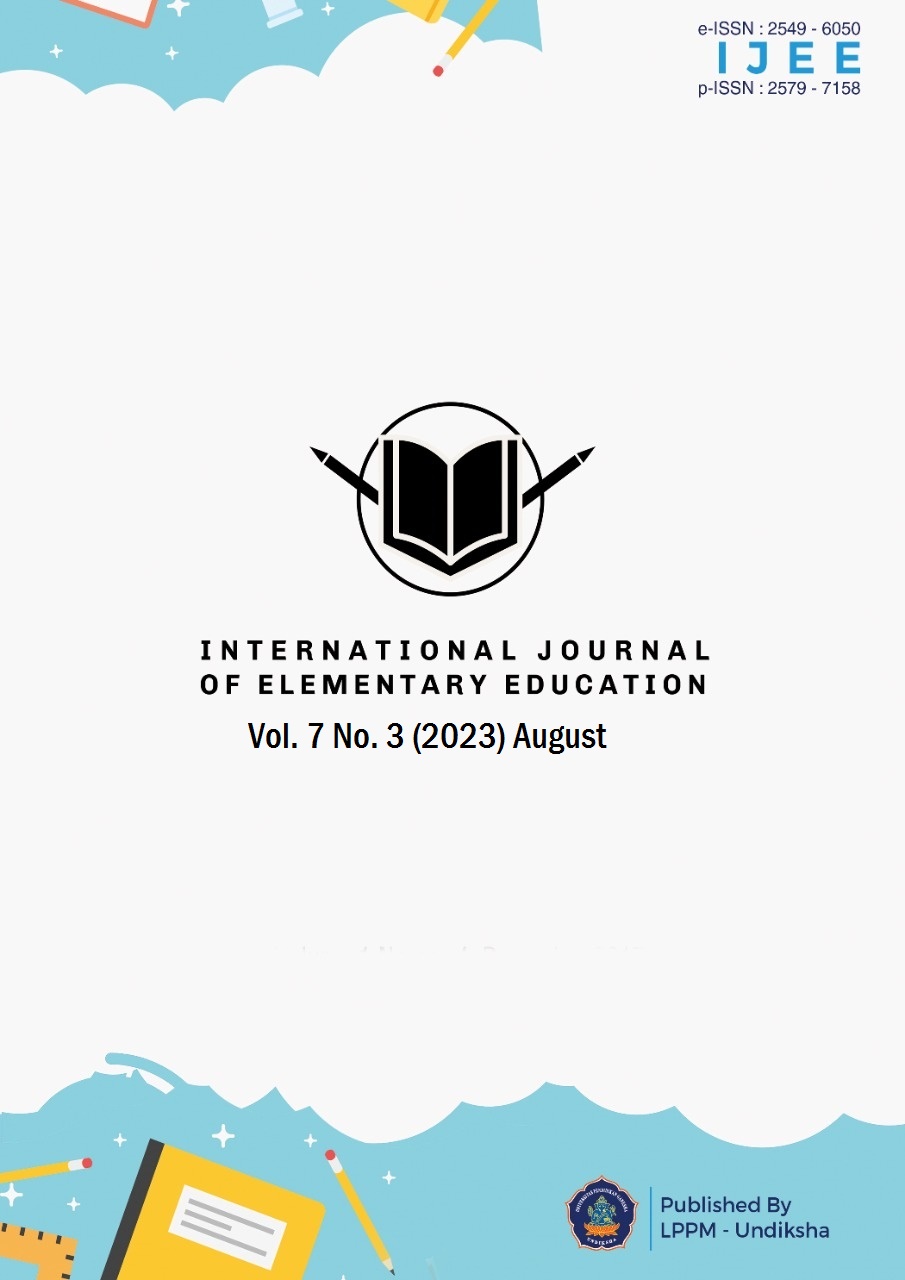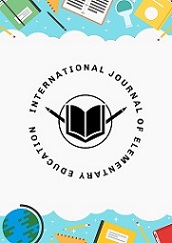Digital Literacy and its Impact on Reading Interest in Prospective Elementary School Teachers
DOI:
https://doi.org/10.23887/ijee.v7i3.61819Keywords:
Literacy, Digital Literacy, Interest in ReadingAbstract
The rapid development of technology in the 21st century requires that every individual is skilled in using digital devices, including in the world of education. The ease of accessing information through digital media should increase students' interest in reading. This study aims to analyze the effect of digital literacy on students' reading interest. The research method used is quantitative with survey research methods. The population in this study were all 6th semester students. Sampling in this study used a purposive sampling technique that found 44 students in total. The instrument uses a Likert scale type interval questionnaire. Data analysis techniques, namely descriptive test, normality test, linearity test, and research hypothesis testing using a simple linear regression test. The results of this study indicate that digital literacy has a significant influence on students' reading interest. This means that digital literacy has a strong influence on students' reading interest. Digital literacy also has a positive influence on reading interest, which means that the better the student's digital literacy, the better the student's reading interest. This is indicated by the results of the coefficient table which has a significant value of 0.000 < 0.05. So it can be concluded that there is an influence of digital literacy on students' reading interest.
References
Afriyanti, I., Wardono, & Kartono. (2018). Pengembangan Literasi Matematika Mengacu PISA Melalui Pembelajaran Abad Ke-21 Berbasis Teknologi. PRISMA (Prosiding Seminar Nasional Matematika), 608–617. https://journal.unnes.ac.id/sju/index.php/prisma/article/view/20202.
Akbar, A., Aminu, N., Buton, U. M., Sekolah, G., Kegunaan, D., & Buton, U. M. (2022). Penguatan Literasi Digital Mahasiswa PGSD FKIP Universitas Muhammadiyah Buton. Jurnal Abdidas, 3(26), 548–555. https://doi.org/10.31004/abdidas.v3i3.627. DOI: https://doi.org/10.31004/abdidas.v3i3.627
Akbar, M. F. dan F. D. A. (2017). Teknologi Dalam Pendidikan: Literasi Digital Dan Self Directed Learning Pada Mahasiswa Skripsi. Jurnal Indigenous, 2(1), 28–38. https://doi.org/10.23917/indigenous.v1i1.4458. DOI: https://doi.org/10.23917/indigenous.v1i1.4458
Akmal, S., & Mulia, I. D. (2020). Investigating students’ interest on reading journal articles: Materials, reasons and strategies. Studies in English Language and Education, 7(1), 194–208. https://doi.org/10.24815/siele.v7i1.15358. DOI: https://doi.org/10.24815/siele.v7i1.15358
Aprilia, F., Lustyantie, N., & Rafli, Z. (2020). The Effect of Reading Interest and Achievement Motivation on Students ’ Discourse Analysis Competence. Journal of Education and E-Learning Research, 7(4), 368–372. https://doi.org/10.20448/journal.509.2020.74.368.372. DOI: https://doi.org/10.20448/journal.509.2020.74.368.372
Aqil Siroj, H., Witono, A. H., & Khair, B. N. (2022). Pengaruh Literasi Digital terhadap Minat Baca Siswa Kelas V di SDN 1 Dasan Tapen Tahun Pelajaran 2021/2022. Jurnal Ilmiah Profesi Pendidikan, 7(3), 1049–1057. https://doi.org/10.29303/jipp.v7i3.668. DOI: https://doi.org/10.29303/jipp.v7i3.668
Audrin, C., & Audrin, B. (2022). Key factors in digital literacy in learning and education: a systematic literature review using text mining. Education and Information Technologies, 27(6), 7395–7419. https://doi.org/10.1007/s10639-021-10832-5. DOI: https://doi.org/10.1007/s10639-021-10832-5
Bolanakis, Di. E. (2019). A Survey of Research in Microcontroller Education. Revista Iberoamericana de Tecnologias Del Aprendizaje, 14(2), 50–57. https://doi.org/10.1109/RITA.2019.2922856. DOI: https://doi.org/10.1109/RITA.2019.2922856
Bravo, M. C. M., Chalezquer, C. S., & Serrano-Puche, J. (2021). Meta-framework of digital literacy: Comparative analysis of 21st century skills frameworks. Revista Latina de Comunicacion Social, 2021(79), 76–110. https://doi.org/10.4185/RLCS-2021-1508 DOI: https://doi.org/10.4185/RLCS-2021-1508
Carin, A. A., Sund, R. ., & Lahkar, B. K. (2018). No 主観的健康感を中心とした在宅高齢者における 健康関連指標に関する共分散構造分析Title. Journal of Controlled Release, 11(2), 430–439. https://cir.nii.ac.jp/crid/1050282813249656320.
Churchill, N. (2020). Development of students ’ digital literacy skills through digital storytelling with mobile devices. Educational Media International, 00(00), 1–14. https://doi.org/10.1080/09523987.2020.1833680. DOI: https://doi.org/10.1080/09523987.2020.1833680
Creswell, J. W., & Creswell, J. D. (2018). Research Design: Qualitative, Quantitative, and Mixed Methods Approaches. 5th edn. In Los Angeles, California, USA: SAGE Publications, Inc.
Damaianti, V. S., Abidin, Y., & Rahma, R. (2020). Higher order thinking skills-based reading literacy assessment instrument: An Indonesian context. Indonesian Journal of Applied Linguistics, 10(2). https://doi.org/10.17509/ijal.v10i2.28600. DOI: https://doi.org/10.17509/ijal.v10i2.28600
Eddy, I. W. T. (2023). Digitizing Cultural Practices : Efforts to Increase Students ’ Cultural Knowled ge and Reading Interest in Bali. 14(1), 142–152. https://doi.org/10.17507/jltr.1401.15. DOI: https://doi.org/10.17507/jltr.1401.15
Fadli, M. R. (2021). Hubungan Filsafat dengan Ilmu Pengetahuan dan Relevansinya Di Era Revolusi Industri 4.0 (Society 5.0). Jurnal Filsafat, 31(1). https://doi.org/10.22146/jf.42521. DOI: https://doi.org/10.22146/jf.42521
Hadayani, D. O., Delinah, & Nurlina. (2020). Membangun Karakter Siswa Melalui Literasi Digital Dalam Menghadapi Pendidikan Abad 21 (Revolusi Industri 4.0). Prosiding Seminar Nasional Pendidikan Program Pascasarjana Universitas PGRI Palembang, 21, 999–1015. http://www.jurnal.stkippgritulungagung.ac.id/index.php/eduproxima/article/view/3926.
Hendarsyah, D. (2019). E-Commerce Di Era Industri 4.0 Dan Society 5.0. IQTISHADUNA: Jurnal Ilmiah Ekonomi Kita, 8(2), 171–184. https://doi.org/10.46367/iqtishaduna.v8i2.170. DOI: https://doi.org/10.46367/iqtishaduna.v8i2.170
Law, N., Woo, D., & Wong, G. (2018). A global framework of reference on digital literacy skills for indicator 4.4. 2. UNESCO.
Leaning, M. (2019). An Approach to Digital Literacy through the Integration of Media and. Media and Communication, 7(2), 4–13. https://doi.org/10.17645/mac.v7i2.1931. DOI: https://doi.org/10.17645/mac.v7i2.1931
Lestari, R. P., Fitriani, S. S., & Erdiana, N. (2017). Reading Comprehension Difficulties Encountered By Senior High School EFL Students. Research in English and Education (READ), 2(2), 110–118. http://www.jim.unsyiah.ac.id/READ/article/view/5772.
Mayevskaya, E. L. (2018). Digital transformations in Germany: Universities in the era of digital technologies. Proceedings of the II International Scientific Conference, 72–86. https://doi.org/10.23947/itno.2018.3.513-5199. DOI: https://doi.org/10.23947/itno.2018.3.513-5199
Moore, R. C., & Hancock, J. T. (2022). OPEN A digital media literacy intervention for older adults improves resilience to fake news. Scientific Reports, 1–9. https://doi.org/10.1038/s41598-022-08437-0. DOI: https://doi.org/10.1038/s41598-022-08437-0
Namaziandost, E., Neisi, L., Mahdavirad, F., & Nasri, M. (2019). The relationship between listening comprehension problems and strategy usage among advanced EFL learners. Cogent Psychology, 6(1), 1–19. https://doi.org/10.1080/23311908.2019.1691338. DOI: https://doi.org/10.1080/23311908.2019.1691338
Pakistyaningsih, A., Nurdyansyah, By Arifin, M. B. U., Rudyanto, H. E., & Rais, P. (2019). School library utilization technology model to improve reading interest and reading ability in elementary education. Universal Journal of Educational Research, 7(9), 1945–1955. https://doi.org/10.13189/ujer.2019.070914. DOI: https://doi.org/10.13189/ujer.2019.070914
Pangrazio, L., Godhe, A. L., & Ledesma, A. G. L. (2020). What is digital literacy? A comparative review of publications across three language contexts. E-Learning and Digital Media, 17(6), 442–459. https://doi.org/10.1177/2042753020946291. DOI: https://doi.org/10.1177/2042753020946291
Reddy, P., Sharma, B., & Chaudhary, K. (2020). Digital Literacy : A Review of Literature. International Journal of Technoethics (IJT), 11(2), 65–94. https://doi.org/10.4018/IJT.20200701.oa1. DOI: https://doi.org/10.4018/IJT.20200701.oa1
Ririen, D., & Daryanes, F. (2022). Analisis Literasi Digital Mahasiswa. Research and Development Journal of Education, 8(1), 210. https://doi.org/10.30998/rdje.v8i1.11738. DOI: https://doi.org/10.30998/rdje.v8i1.11738
Senen, A., Sari, Y. P., Herwin, H., Rasimin, R., & Dahalan, S. C. (2021). The use of photo comics media: Changing reading interest and learning outcomes in elementary social studies subjects. Cypriot Journal of Educational Sciences, 16(5), 2300–2312. https://doi.org/10.18844/cjes.v16i5.6337. DOI: https://doi.org/10.18844/cjes.v16i5.6337
Setia, M. S. (2016). Methodology series module 3: Cross-sectional studies. Indian Journal of Dermatology, 61(3), 261. https://doi.org/10.4103/0019-5154.182410. DOI: https://doi.org/10.4103/0019-5154.182410
Setyawati, N., Maspuroh, U., & Rosalina, S. (2021). Pengaruh Literasi Digital terhadap Pemahaman Bacaan Cerpen pada Kalangan Remaja Pengguna Media Sosial Aktif. Jurnal Pendidikan Bahasa Dan Sastra Indonesia Undiksha, 11(4), 417–424. https://doi.org/10.23887/jjpbs.v11i4.40124. DOI: https://doi.org/10.23887/jjpbs.v11i4.40124
Simbolon, M. & N. (2022). Pengaruh Literasi Digital Terhadap Minat Baca Siswa. Jurnal Cakrawala Pendas, 8(2), 532–542. https://doi.org/10.31949/jcp.v8i2.2449.
Spante, M., Hashemi, S. S., Lundin, M., & Algers, A. (2018). Digital competence and digital literacy in higher education research: Systematic review of concept use. Cogent Education, 5(1), 1519143. https://doi.org/10.1080/2331186X.2018.1519143. DOI: https://doi.org/10.1080/2331186X.2018.1519143
Sukarno, & Widdah, M. El. (2020). The effect of students’ metacognition and digital literacy in virtual lectures during the covid-19 pandemic on achievement in the “methods and strategies on physics learning” course. Jurnal Pendidikan IPA Indonesia, 9(4), 477–488. https://doi.org/10.15294/jpii.v9i4.25332. DOI: https://doi.org/10.15294/jpii.v9i4.25332
Sultan, Rapi, M., Mayong, & Suardi. (2020). Textbook discourse readability: Gender, reading interest, and socio-economic status of students with poor reading ability. Cakrawala Pendidikan, 39(3), 583–596. https://doi.org/10.21831/cp.v39i3.32326. DOI: https://doi.org/10.21831/cp.v39i3.32326
Sumitra, A., & Sumini, N. (2019). Peran Guru Dalam Mengembangkan Kemampuan Minat Baca Anak Usia Dini Melalui Metode Read Aloud. Jurnal Ilmiah Potensia, 4(2), 115–120. https://doi.org/10.33369/jip.4.2.115-120. DOI: https://doi.org/10.33369/jip.4.2.115-120
Widiastini, N. K. (2021). Pengaruh Literasi Digital Melalui Pemanfaatan Melajah.Id Terhadap Hasil Belajar Membaca. Jurnal Pendidikan Dan Pembelajaran Bahasa, 10(2), 219–228. https://doi.org/10.23887/jurnal_bahasa.v10i2.723. DOI: https://doi.org/10.23887/jurnal_bahasa.v10i2.723
Wulandari, D. R., & Sholeh, M. (2021). Efektivitas Layanan Literasi Digital Untuk Meningkatkan Minat Baca Siswa Di Masa Pandemi Covid-19. Jurnal Inspirasi Manajemen Pendidikan, 9(2), 327–335. https://ejournal.unesa.ac.id/index.php/inspirasi-manajemen-pendidikan/article/view/39155.
Yunita Anindya, E. F., Suneki, S., & Purnamasari, V. (2019). Analisis Gerakan Literasi Sekolah Pada Pembelajaran Tematik. Jurnal Ilmiah Sekolah Dasar, 3(2), 238. https://doi.org/10.23887/jisd.v3i2.18053. DOI: https://doi.org/10.23887/jisd.v3i2.18053
Downloads
Published
How to Cite
Issue
Section
License
Copyright (c) 2023 Ranita Haeroni

This work is licensed under a Creative Commons Attribution-ShareAlike 4.0 International License.
Authors who publish with the International Journal of Elementary Education agree to the following terms:
- Authors retain copyright and grant the journal the right of first publication with the work simultaneously licensed under a Creative Commons Attribution License (CC BY-SA 4.0) that allows others to share the work with an acknowledgment of the work's authorship and initial publication in this journal.
- Authors are able to enter into separate, additional contractual arrangements for the non-exclusive distribution of the journal's published version of the work (e.g., post it to an institutional repository or publish it in a book), with an acknowledgment of its initial publication in this journal.
- Authors are permitted and encouraged to post their work online (e.g., in institutional repositories or on their website) prior to and during the submission process, as it can lead to productive exchanges, as well as earlier and greater citation of published work. (See The Effect of Open Access)










